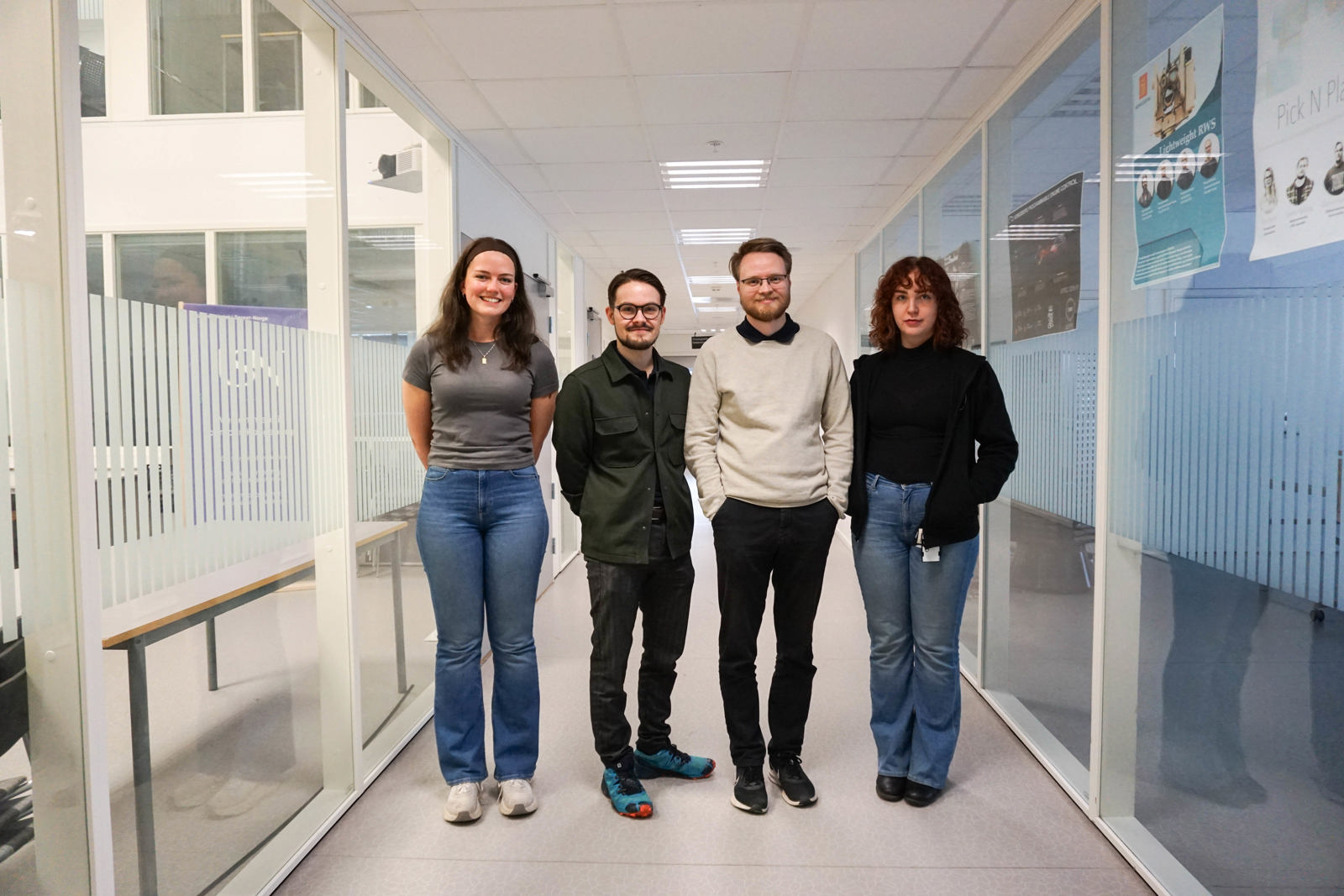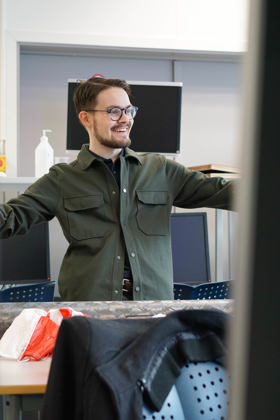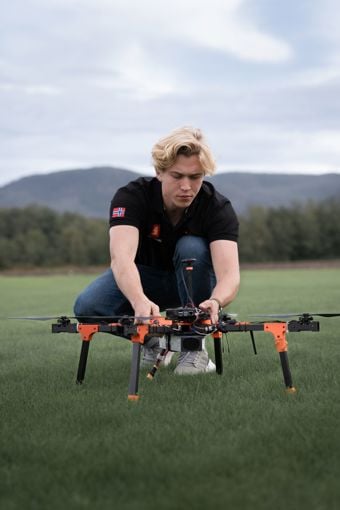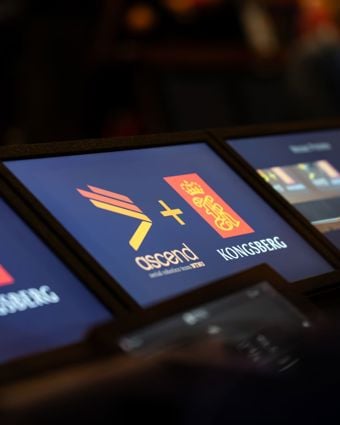
USN Horizon – “Not Rocket Science”
USN Horizon is a new student organization founded in September 2023, aiming to build rockets and engage in space exploration. With 26 members already, the organization is ambitious and has clear goals for the future. This year, their project named "Not Rocket Science" involves the students building their own rocket to compete in the prestigious EuRoC 2024 competition.
-
Text:Amanda Chapman-Stavn / KONGSBERG
Photo:Amanda Chapman-Stavn / KONGSBERG
Kongsberg Defence & Aerospace supports USN Horizon, situated locally in Kongsberg, with financial resources under an agreement that spans over two years. In addition to financial assistance, Kongsberg Defence & Aerospace also provides professional and technical support, as well as facilities when needed.
"Strengthening our partnership with University of South-Eastern Norway (USN) through our support for USN Horizon benefits both parties immensely and is critically important.
We observe a declining interest in STEM fields, which may lead to a future skills shortage that is vital to the community. By supporting student organizations like USN Horizon, we not only help them achieve their goals but also contribute to enhancing the community's future skills.
This is essential for the collective good," explains Jan Dyre Bjerknes, Senior System Engineer at Kongsberg Defence & Aerospace, and responsible for the collaboration agreement with the students.
"Moreover, it's especially rewarding to offer support locally in Kongsberg where we also have our main office," he adds.
USN Horizon also highlights the partnership as a valuable resource.
"It's a seal of quality for us to have the support from Kongsberg Defence & Aerospace. While we couldn't have done it without their financial assistance, the value of the expertise we receive is truly immeasurable – it's priceless.”
– Hannes Weigel, USN Horizon.
Established to test their limits
Hannes Weigel, a third-year computer engineering student, is the CEO of USN Horizon. The dream and idea behind the student organization began six months before its official establishment. Hannes and Ole Eirik came together to launch USN Horizon with the purpose of testing their own limits.
"We've always had a passion for space exploration, pushing the limits of what we could achieve independently. It began as an immense challenge that really sparked our interest. Initially, it was about developing a rocket engine, but as our ambitions grew, we decided to construct a complete rocket", says Weigel.
The long-term goals of the student organization are still closely guarded, but in 2024, they are ramping up for the project "Not Rocket Science," aiming to take part in the prestigious EuRoC-competition in Portugal. For the first time, they will launch the four-meter-long rocket, engineered to transport a payload to an altitude of 9,000 meters, powered by a solid-fuel rocket engine sourced from a Canadian manufacturer.
This year marks the fifth edition of the EuRoC, hosted by the Portuguese Space Agency. This competition, highlighting European university teams' innovations in space technology, will take place in October, showcasing the growing interest and advancements in rocket technology across Europe.
The competition is evaluated across several categories, including teamwork, execution, and payload. Additionally, USN Horizon has appointed a dedicated member to focuse on comprehending all the challenging criteria’s for participation in EuRoC.
Offers students a hands-on approach to academics and professional life
From the very beginning, many students have shown great interest in USN Horizon, something Weigel believes may be due to a long-standing vacuum in the city for a more long-term project that students can engage in.

"Moreover, USN Horizon's project 'Not Rocket Science' carries a certain wow factor. Being involved in building a rocket from scratch appeals to most people who have the right interest. The recruitment process has largely been self-sustaining," explains Weigel.
Participating in a student organization like USN Horizon offers students valuable hands-on experience relevant to both their studies and the professional world. USN Horizon encompasses all the roles found in real businesses that are necessary for optimal functioning.
"We don't have strict criteria for membership. Generally, we look for motivated students who are truly passionate about their field. We have one recruitment process per semester, but if someone knocks on the door full of enthusiasm, we won't turn them away. If you're willing to dedicate your valuable time, you are valuable to us," says the CEO as he opens the door to welcome the 26th member to the group.
Clear Expectations and Timelines
Mette-Marie Lønstad serves as the Communications Manager for USN Horizon and is currently in her second year studying Economics and Management at USN. In her role, she oversees the student organization's social media, public relations, and provides guidance on general organizational processes. With involvement in HR-related tasks, she has developed a broad skill set and knowledge base that will be advantageous in her career post-graduation.
"When Hannes presented the vision and upcoming plans for USN Horizon, I was so inspired that I couldn't turn it down. The organization is fueled by a driven team. Under Hannes's leadership, clear expectations and timelines are established, which are essential for us to reach our objectives."
The students estimate that their involvement with the organization, on top of their studies, equates to about a 50% part-time job. Nonetheless, this commitment doesn't hinder their ambitious objectives.
"If you really want to, you'll find the time," explains Ole Eirik Solberg Seljordslia, Head of Avionics. He is a third-year Computer Engineering student at USN and a founding member of USN Horizon.
His role involves mapping out how the systems interconnect, identifying challenges, and contributing to solutions. Ole Eirik has also designed the rocket's “brain” from scratch.
The support from Kongsberg Defence & Aerospace has been crucial in this process.
A Space Race Among Student Organizations
The Recovery Department at USN Horizon consists of six people, represented here by Helle Hagen, who is in her first year of the mechanical engineering program. They also scrutinize programs and designs for errors and improvements, with much of their day spent drawing in SolidWorks. The Recovery Department is responsible for the rocket's separation part – the high-pressure release system.
"In short, we design the components for the solutions we want to implement. It's a crucial part of the rocket, ensuring everything runs smoothly during EuRoC 2024," Hagen continues. Together with the team, we mostly talk about USN Horizon in every spare minute throughout the week.
The enthusiastic students all agree that there is a space race in Norway among those working with rockets. The universal goal is to reach space, defined as 100 kilometers in altitude. Currently, there are five student organizations working on rockets. Helle has an ambitious, yet exciting goal.
"We hope to reach this goal while we are still students at USN," she says with a smile.

A Cohesive Group
The four students unanimously highlight the opportunities USN Horizon offers, opportunities that extend from academic and practical to social aspects. The rocket team places a high priority on team building, believing much of the quality they deliver stems from being a close-knit group that also have fun together.
"One of the criteria’s for EuRoC is execution and teamwork. It's also important to build a sense of community," says Lønstad.
There is no doubt that a practical approach to work and a passionate commitment open doors to future work opportunities. Jan Dyre Bjerknes of Kongsberg Defence & Aerospace emphasizes this point, adding:
"One of the first things we look for when hiring is personality and the ability to show initiative. Naturally, one must know their field, but much can also be learned. The drive and commitment the students show will be equally important."







